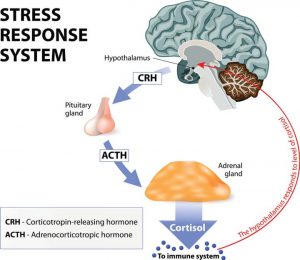Adrenal fatigue – Chronic Fatigue – HPA Axis Dysfunction
Adrenal fatigue has been a popular term for many years to describe a set of symptoms which is becoming increasingly common in our modern lifestyle. These symptoms include:
- Persistent unexplained fatigue
- Waking unrefreshed after a good night’s sleep
- Brain fog
- Impaired memory
- Muscle aches and joint pains
- Tiring easily after minor exertion
- Decreased capacity to handle stress
- Mild depression
- Irritability
- Low libido
- Frequent infections
However it turns out that science does not support the concept of adrenal fatigue, that stress causes low cortisol release from the adrenals that then leads to the list of symptoms described. It used to be thought that chronic stress would lead to prolonged cortisol stimulation, which would eventually wear out the adrenals. However, scientific studies do not show a consistent pattern of dysfunctional cortisol levels with “adrenal fatigue” and in fact the adrenals response to being stimulated by the control hormone ACTH, is still very much positive.
 Instead, there is a more complicated process involved with stress and the term HPA axis dysfunction is now being used to describe this. HPA stands for hypothalamic- pituitary-adrenal axis and these three glands work together to regulate the stress response, moods, metabolism, energy production and the immune system.
Instead, there is a more complicated process involved with stress and the term HPA axis dysfunction is now being used to describe this. HPA stands for hypothalamic- pituitary-adrenal axis and these three glands work together to regulate the stress response, moods, metabolism, energy production and the immune system.
So when any one point in the axis isn’t working efficiently, this can affect the next series of reactions and so on much like a domino effect. Is it any wonder that the varied list of symptoms associated with ”adrenal fatigue” may present?
HPA axis dysfunction then is an alteration in the stress response over time and has been verified and associated with many different conditions. These include chronic illness or stress, PTSD, disrupted circadian rhythms, toxin exposure, infections, loss of a loved one and poor diet.
It is imperative to exclude other causes of fatigue such as iron deficiency and thyroid dysfunction before addressing the drivers of HPA axis dysfunction. As chronic stress and lifestyle factors feature significantly in the list of causes, steps to address these areas can have a significant effect on recovery.
Regular mindfulness practices and a gentle exercise routine can be beneficial in reducing the impact of stress as many specific psychological strategies.
The importance of circadian rhythms to maintaining health is well researched, therefore it is essential to have adequate and good quality sleep. Also having a regular schedule which includes sleeping and eating that aligns with our circadian rhythms helps everything function optimally.
An individual tailored program that involves addressing the lifestyle factors that have lead to the HPA axis dysfunction, dietary changes and nutritional supplements can all be part of a holistic approach to deal with fatigue and allow a person to regain the energy and vitality that they previously had.
 Migraine Headache Treatment
Migraine Headache Treatment